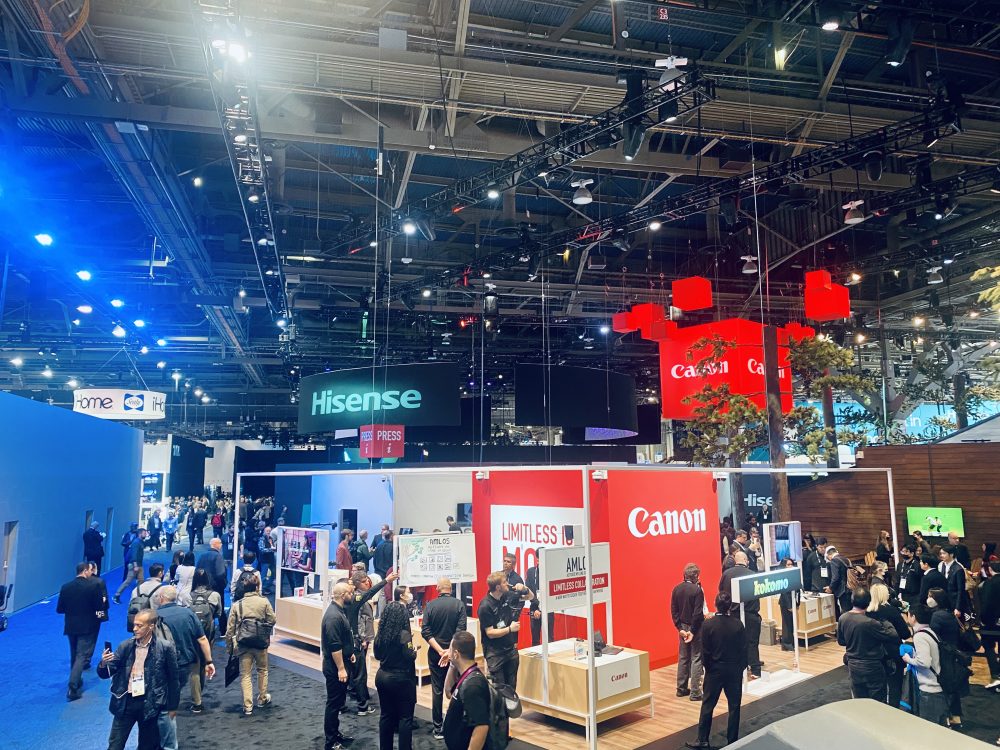At CES 2023, juggernaut technologies and innovations like AR, EVs, XR, and 5G shared headlines with a different kind of breakthrough – the latest in compassion, empathy, and environmental concern. While cutting-edge gadgets and services often separate the early adopters from the masses, these DEI-focused technologies have the opposite effect, promoting inclusion and welcoming every potential user – regardless of disability, neurological status, and other so-called “barriers” – as well as promoting the well-being of planet Earth.
Anyone walking the floor in Vegas this year could not help but notice the remarkable ingenuity – and investments – being devoted to purpose-focused technologies by some of the world’s biggest consumer brands. Appliance maker LG proudly hyped products that conform to the latest standards of the Americans with Disabilities Act (ADA). Samsung partnered with Ocean Wise Plastics Lab and Patagonia to create a washing machine filter that reduces microplastics in water. And cosmetics maker L’Oreal took home two awards at CES for inclusive beauty technology.
Having spent an inspiring and overwhelming week at the Greatest Tech Show on Earth, what did we take away when it comes to the consumer world’s new focus on purposeful design and right actions? Should brands take the purpose plunge – and how can they ride the wave without crashing to the shore?
- Today’s consumers expect their brands to have a conscience
It is no accident that major consumer-facing manufacturers are taking on sustainability and ethical design in earnest. Research from GfK Consumer Life and others shows that many people now insist that the brands they buy and identify with put caring into action. Glib press releases and one-off donations to random causes no longer do the trick; brands need to take ongoing, real-world steps to help the environment, differently abled consumers, and others.
- Insincerity will get you nowhere
Consumers today – especially Millennials and Gen Z – are alert to whether a given brand and its purpose efforts ring true or fail to convince. “Greenwashing” and “purpose washing” are everyday hazards of DEI-focused marketing, and these dreaded labels can be applied even to those who have spent millions to do what might seem like good works. If pundits and purchasers think they see nefarious motives or simply empty promises in products or campaigns, the sweetness of being “model citizens” may quickly turn sour. Consider Starbucks, which switched to a new “straw-free” lid as part of its sustainability drive; but the lid turned out to have more plastic than the original straw and lid combined.
- Play by the rules (and regulations)
While acting with purpose may seem like a good thing to do when time and money permit, the truth is that many accessibility requirements have now been codified in law – and the price of non-compliance can be steep. Electronic Arts and DraftKings were both hit with accessibility lawsuits just last year, and Target famously paid $6 million in 2008 to settle a case filed by the National Association for the Blind. Retailers and manufacturers alike need to understand regulations from the ADA and others – and stay up to speed continuously, because these restrictions change often.
- Be cautious about profiting from good works
Some electronics brands now charge a premium for energy-efficient devices that will, in theory, save consumers money in the long run – and be kinder to the environment. But a recent GfK analysis showed that the financial benefits of premium energy-saving products faded away in a rational, longterm cost evaluation. Do manufacturers assume that their customers will never do the math? The calculation is risky, because the broader damage when a brand is found to be exploitive may well be more costly than the profits made today.
- It’s OK to let consumers know that you are trying to do better
While hyping purposeful efforts can be a dangerous game, concealing them is also problematic. In the end, the equity built by respecting the environment and differently abled consumers can be a powerful plus for your brand – and taking that advantage may help support future good works. Displaying certifications and other achievements in product content is just one way to share the news about your efforts. Be sure your claims are accurate and clearly worded, but don’t be afraid to make them.
In the end, it should come as no surprise that sustainability and equity are now star players at CES, because they have become essential, everyday elements of doing business. In some cases, change has been mandated by law, and paying attention is a necessity; but even “optional” measures are increasingly seen as required by many consumers, who want their brands to reflect and act on their values. The trick is mining the purpose vein judiciously – getting the brand boost without doing longterm damage to your good name.















